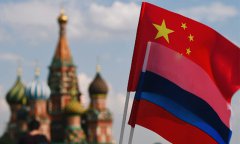War censorship exposes Putin's leaky internet controls
Russia's increasingly strict online censorship measures have paradoxically exposed major shortcomings in the Kremlin's efforts to make the Russian internet a powerful tool of surveillance and social control akin to China's so-called Great Firewall
March 14, 2022, 3:56 AM
7 min read
Share to FacebookShare to TwitterEmail this articlePages from the U.S. State Department's Global Engagement Center report released on Aug. 5, 2020, are seen in this photo. Long before waging war on Ukraine, President Vladimir Putin was working to make Russia's internet a powerful tool of surveillance and social control akin to China's so-called Great Firewall. (AP Photo/Jon Elswick)
BOSTON -- Long before waging war on Ukraine, President Vladimir Putin was working to make Russia's internet a powerful tool of surveillance and social control akin to China's so-called Great Firewall.
So when Western tech companies began cutting ties with Russia following its invasion, Russian investigative journalist Andrei Soldatov was alarmed. He'd spent years exposing Russian censorship and feared that well-intentioned efforts to aid Ukraine would instead help Putin isolate Russians from the free flow of information, aiding the Kremlin's propaganda war.
“Look, guys the only space the Russians have to talk about Ukraine. and what is going on in Russia. is Facebook,” Soldatov, now exiled in London. wrote on Facebook in the war's first week. “You cannot just, like, kill our access.”
Facebook didn’t, although the Kremlin soon picked up that baton, throttling both Facebook and Twitter so badly they are effectively unreachable on the Russian internet. Putin has also blocked access to both Western media and independent news sites in the country, and a new law criminalizes spreading information that contradicts the government's line. On Friday, the Kremlin said it would also restrict access to Instagram. By early Monday, the network monitor NetBlocks found network data showing the social network restricted in Russia across multiple users.
Yet the Kremlin's latest censorship efforts have revealed serious shortcomings in the government's bigger plans to straightjacket the internet. Any Russian with a modicum of tech smarts can circumvent Kremlin efforts to starve Russians of fact.
For instance, the government has so far had only limited success blocking the use of software known as virtual private networks, or VPNs, that allows users to evade content restrictions. The same goes for Putin’s attempts to restrict the use of other censorship-evading software.
That puts providers of internet bandwidth and associated services sympathetic to Ukraine’s plight in a tough spot. On one side, they face public pressure to punish the Russian state and economic reasons to limit services at a time when bills might well go unpaid. On the other, they're wary of helping stifle a free flow of information that can counter Kremlin disinformation — for instance, the state's claim that Russia’s military is heroically “liberating” Ukraine from fascists.
Amazon Web Services, a major provider of cloud computing services, continues to operate in Russia, although it says it’s not taking on any new customers. Both Cloudflare, which helps shield websites from denial-of-service attacks and malware, and Akamai, which boosts site performance by putting internet content closer to its audience, also continue to serve their Russian customers, with exceptions including cutting off state-owned companies and firms under sanctions.
Microsoft, by contrast, hasn’t said whether it will halt its cloud services in the country, although it has suspended all new sales of products and services.
U.S.-based Cogent, which provides a major “backbone” for internet traffic, has cut direct connections inside Russia but left open the pipes through subsidiaries of Russian network providers at exchanges physically outside the country. Another major U.S. backbone provider, Lumen, has done the same.









